Contact us
Contact us to request a quote or learn more about our new products.
TA is proud to showcase our latest innovations in this interactive virtual experience. Featured are two of our newest products, the Discovery X3 DSC and the new Discovery Hybrid Rheometer Series. Learn more about each instrument in the booth by clicking the information button below the product image. To see a closer view of the instrument, click the + buttons located directly on the instruments. If you have any questions, want more information on our products, or would like to request a quote, fill out the contact form to the right to get in touch with one of our experts.
TA Instruments invites you to Discover the possibilities with the Discovery X3 Differential Scanning Calorimeter featuring a multi-sample cell that delivers high quality heat flow data for up to three samples simultaneously. The Discovery X3 DSC combines industry-leading performance with the tools to increase productivity on every level of material research. TA Instruments’ commitment to innovation enables scientists and engineers to reach their goals faster and make critical decisions with confidence.
TA Instruments has set the bar in the science of DSC where best-in-class performance is realized without the need for pre- and post-test data manipulation prevalent in competitive offerings. The Discovery Series DSC’s provide both novice and advanced DSC users the highest confidence in generating superior data, while enhancing laboratory workflows and productivity.
| Instrument Features | X3 DSC |
| Fusion Cell™ | ● |
| MDSC® | ● |
| Enhanced Tzero Heat Flow | ● |
| User Replaceable Cell | ● |
| 54-Position Autosampler | ● |
| Dual input Gas-Delivery Manifold | ● |
| Color App-Style Touch Screen | ● |
| ● Included |
| X3 DSC | |
| Baseline Flatness (-50 to 300°C)[1] | ≤10 μW |
| Baseline Repeatability (-50 to 300°C) | < 15μW |
| Temperature Range | -180°C to 550°C |
| Temperature Accuracy | ±0.025°C |
| Temperature Precision | ±0.005°C |
| Enthalpy Precision | ±0.08% |
| [1] No Baseline subtractions |
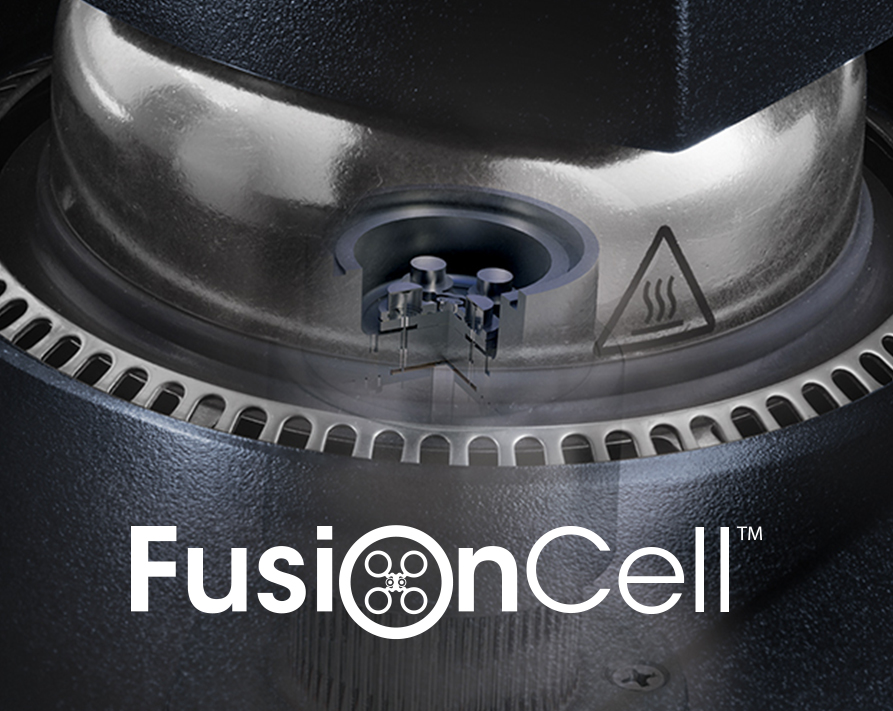
At the core of every Discovery DSC is the NEW TA Fusion Cell™, which incorporates design concepts that “FUSE” together the best features of the world’s bestselling Q-Series
and first generation Discovery DSC, patented Tzero® technology, and new proprietary manufacturing processes. Unlike competitive designs, the Discovery DSC delivers optimum
performance with a single sensor, eliminating the need to exchange sensors to optimize a specific performance aspect. The result is an innovative new DSC with unrivaled
performance in baseline flatness, sensitivity, resolution, and reproducibility.
The Fusion Cell delivers the most absolute heat flow measurement possible. Additionally, lengthy pre- and post-test manipulations such as baseline subtractions or de-smearing routines required by competitive designs are never necessary.
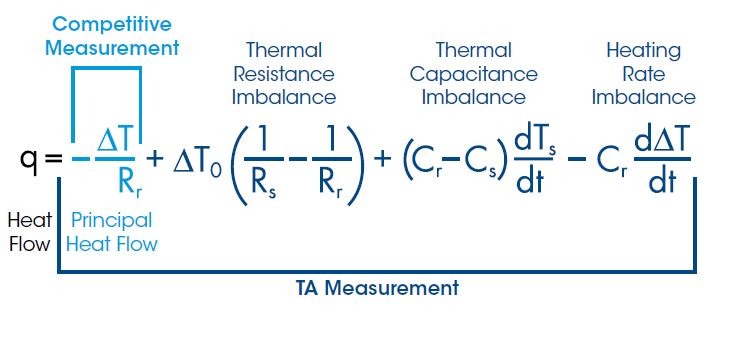
Traditionally, DSC heat flow measurements have been based on the same principle that ASSUMES contributions by the sample and reference sensor to the total measured heat flow simply cancel each other out. If this assumption was true, all DSC’s would have perfectly flat baselines. In reality, they do not. The fact is that each sensor’s resistance and capacitance (ability to store energy) produce imbalances in the heat flow, resulting in deviations from baseline flatness and impaired resolution and sensitivity. ONLY TA Instruments, with patented Tzero Technology, can measure this imbalance. Tzero Technology eliminates complicated pre- and post-test manipulations, such as baseline subtraction, deconvolution or other mathematical treatments competitive designs must use to improve baseline performance, sensitivity and resolution.
Patented Tzero Technology measures the resistance and capacitance of the sensors and utilizes these values in the four-term heat flow equation to give the most accurate real-time determination of heat flow available on any DSC. TA engineers have taken this one step further by also including the contributions of the DSC pans. This Advanced Tzero technology, T4P heat flow, provides the sharpest resolution, the highest sensitivity and allows for the measurement of heat capacity in a single run! Tzero
DISCOVER more Accurate Data with patented Tzero™ Technology
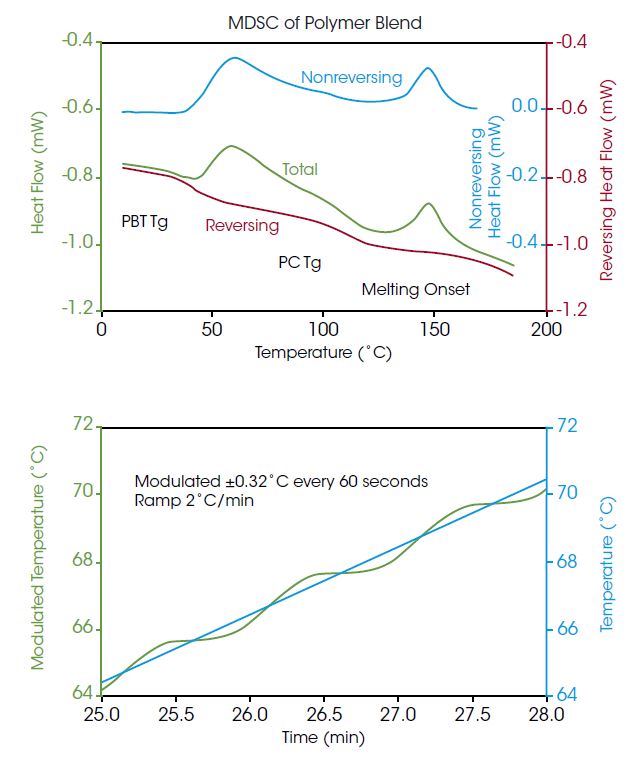
Modulated DSC Gain confidence in data interpretation with the help of MDSC®. Through deconvolution of the Total Heat Flow signal, events such as a glass transition masked under an evaporation peak, or the simultaneous occurrence of a cold crystallization with a melt, are easily revealed.
In TA’s patented MDSC*, a sinusoidal temperature oscillation is overlaid on the traditional linear ramp. The net effect is that heat flow can be measured simultaneously with, and independently of, changes in heat capacity. The Total Heat Flow signal contains the sum of all thermal transitions, just as in standard DSC.
Modulated DSC separates the Total Heat Flow into the Reversing and Non-Reversing Heat Flow signals. The Reversing Heat Flow, comprised of the heat capacity component, contains glass transition and melting transitions. The Non-Reversing Heat Flow, the kinetic component, contains events like curing, volatilization, melting, and decomposition. TA invented MDSC and understands it like no other company. Modulated DSC is a standard feature on EVERY Discovery DSC model.
* U.S. Patent No. 6,561,692
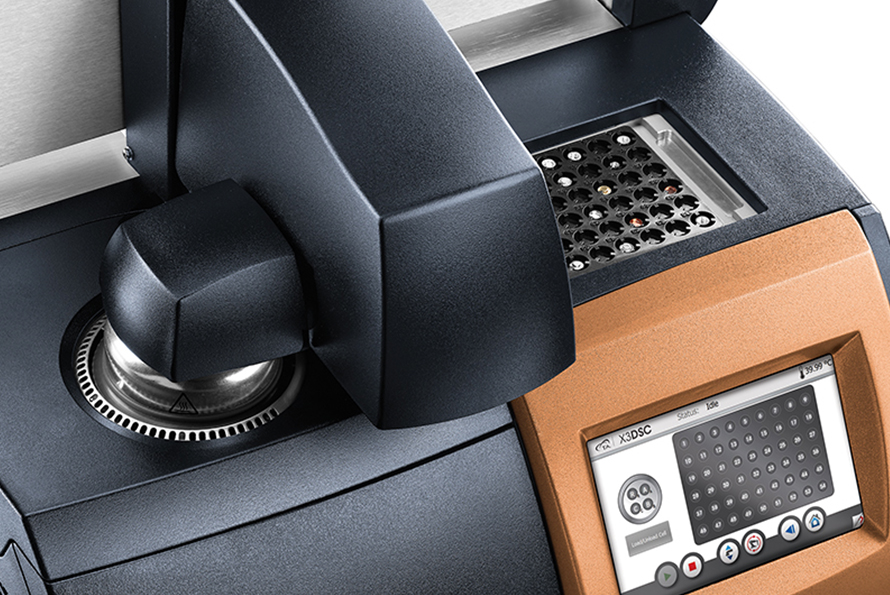
It’s hard to believe we could improve on the most reliable DSC autosampler on the market, but we did! The new linear autosampler was designed to be even more rugged and simple to use than ever before, while offering maximum in testing flexibility.>
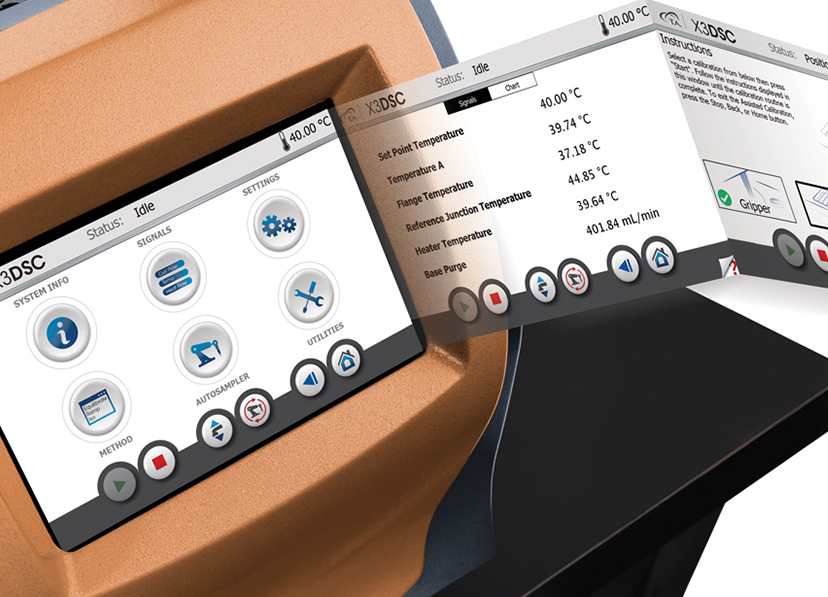
The X3 DSC features TA’s innovative touch screen, making operation easier than ever with enhanced One-Touch-Away™ functionality.
Dramatically improve laboratory workflow and productivity with the One-Touch-Away™ interface, TA’s powerful TRIOS software and the most robust, reliable DSC autosampler. These features enable automated calibration and verification routines that all work seamlessly for a simpler and more intuitive interaction.
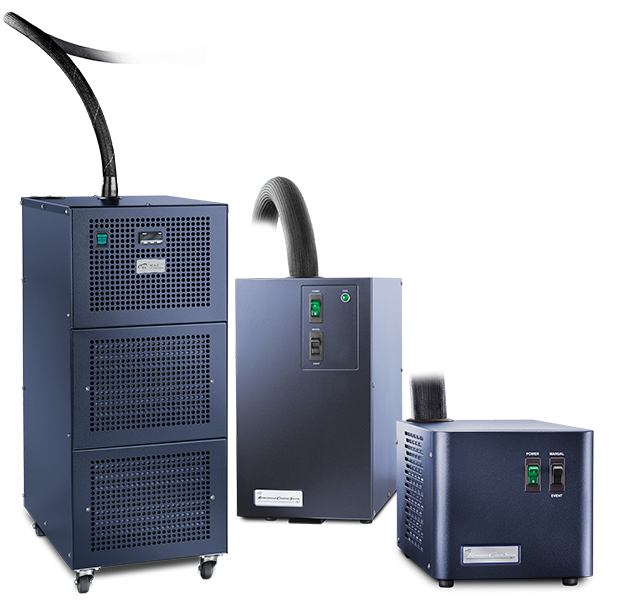
Take advantage of the convenient Refrigerated Cooling Systems (RCS) for unattended DSC and MDSC® operation over broad temperature ranges. The new RCS 120 provides enhanced safety and is the only liquid nitrogen-free system capable of conducting experiments down to -120°C.
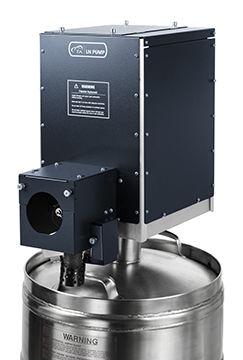
The LN pump provides the highest performance and greatest flexibility in cooling for the Discovery DSC. It facilitates the lowest operational temperature (to -180 °C), greatest cooling rate capacity (to 140 °C/min), fastest sub-ambient equilibration times, and an upper temperature limit of 550°C. Operating at ambient pressure, the LN Pump uses liquid nitrogen efficiently, thus reducing operating costs. It includes a 50-liter Dewar with auto-fill capability which allows the LN Pump to be automatically refilled from a larger source, even during a DSC experiment, for continuous DSC operation with no disruption.>
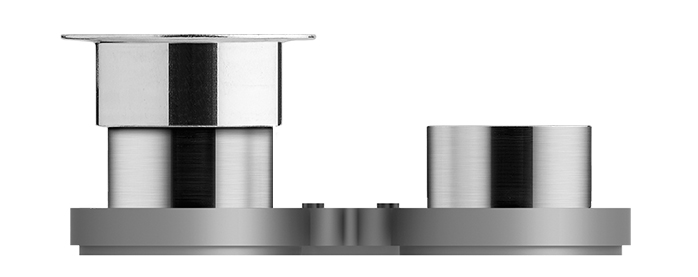
Tzero high-performance pans and lids are designed to maximize pan flatness and sample contact. Coupled with the unparalleled flatness and uniformity of the Fusion Cell™ sensor, the Tzero pans and lids provide the most direct, uniform heat flow path from the sample to the sensor. These pans are tolerant of many sample forms and are designed with lids that conform to the top of irregular specimens, efficiently transferring heat to and from the entire sample. Competitive pan designs that have non-flat bases are unable to achieve appropriate thermal contact with solid specimens. Fabricated using advanced technology and to extremely tight tooling specifications, the Tzero pans offer significant improvements in resolution and repeatability over any other pan design.>
The Tzero press takes sample encapsulation to a higher level of performance and convenience in conventional and hermetic sealing of a wide variety of materials. The press kit includes four die sets for Tzero aluminum and hermetic pans & lids. Optional die sets are available for high-volume DSC pans and Discovery TGA sealed pans. The die sets are magnetically attached with no tools or adjustments required. In addition, each die set is color-coded to the box containing the compatible Tzero or standard aluminum hermetic pans and lids.
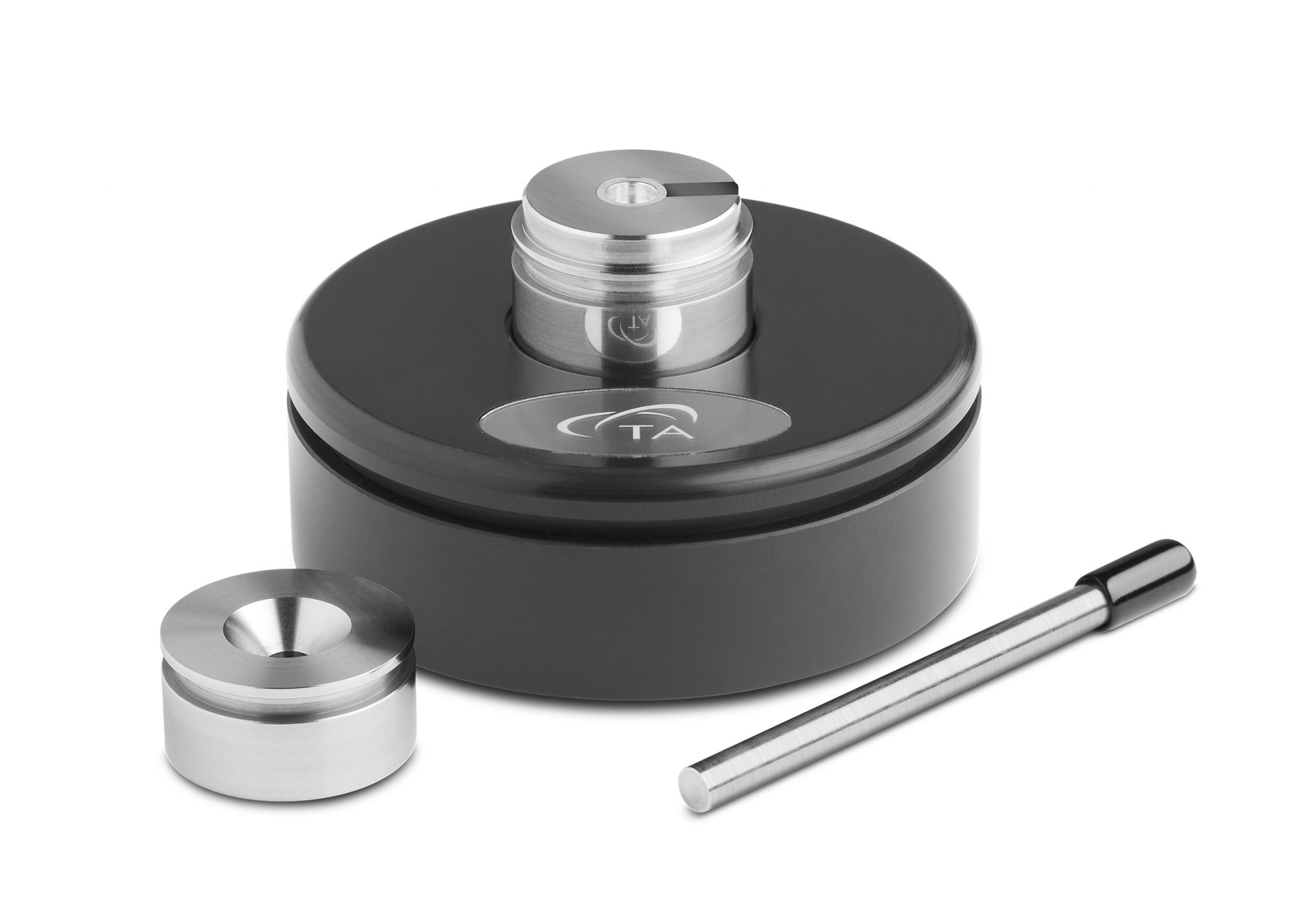
The task of loading powder samples into Tzero pans is now quicker and easier with the powder sample prep kit. Specifically designed to maximize the performance of Tzero Pans with powdered samples, the kit consists of a non-skid base and a three-part tool precision machined from high quality stainless steel. The lower tool has a precisely designed recess that holds the Tzero pan and supports and protects the bottom of the pan. The upper tool mounts over the pan, forming a funnel which directs the sample into the center of the pan, avoiding undesirable contamination of the outside surfaces of the pan. A steel rod is used to pack the sample firmly into the bottom of the pan, forming a packed layer of the powder while preserving the flatness of the bottom of the Tzero pan. Using this tool you can easily and effectively optimize the results of your DSC measurements of powdered samples.
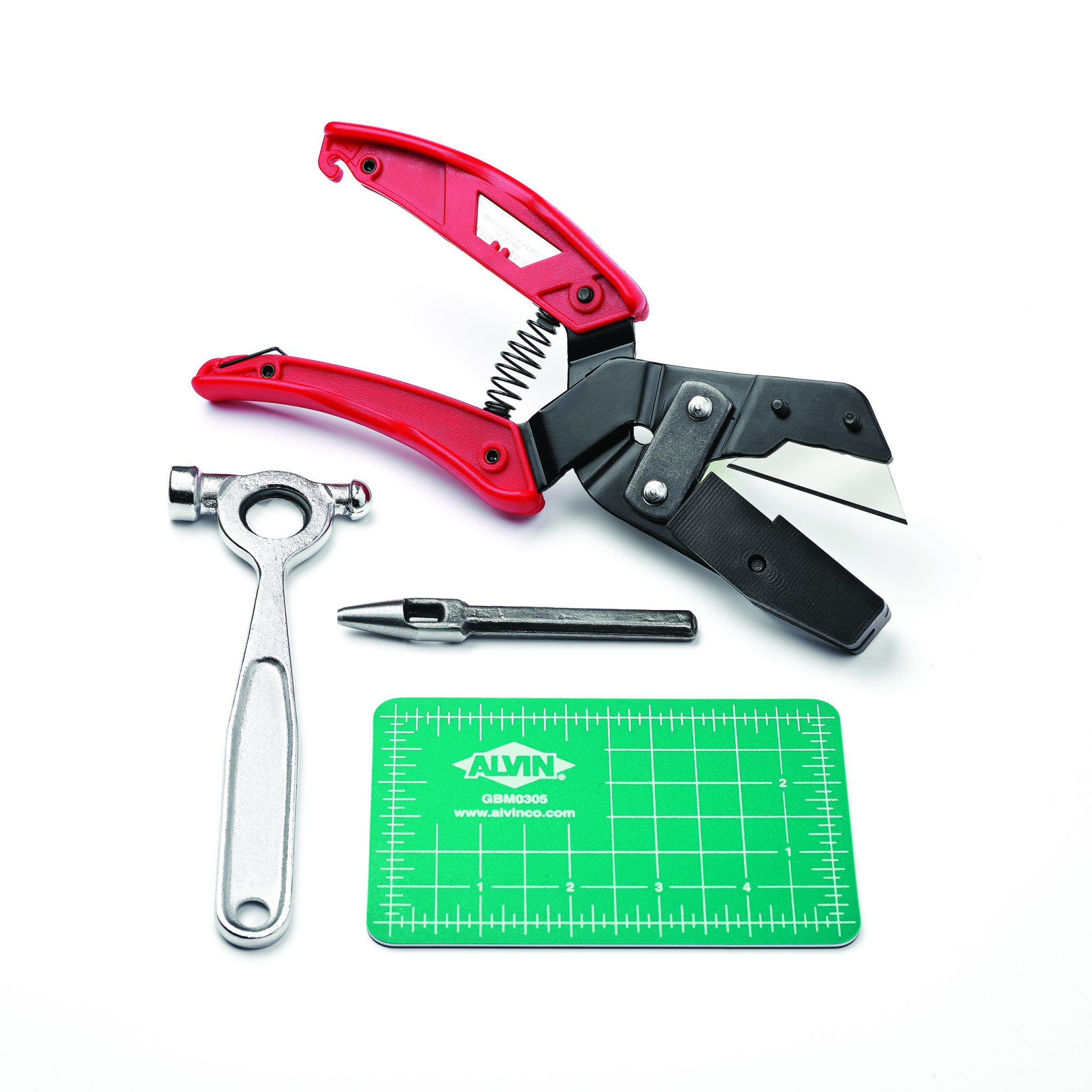
Samples for testing in the DSC come in all different forms, shapes, and sizes and typically require some type of manipulation before they can be loaded into a DSC pan. The sample cutting kit includes tools that will make it simple and easy to properly prepare samples for the ultimate repeatability and reliability of the results. A pliers-style sample cutter will provide a sample with a clean, flat surface to maximize sample to pan contact. A 4mm hole-punch and hammer will allow film samples to be cut into a consistent size perfect for Tzero pans. This tool kit is designed to help ensure that the high-level performance of the Fusion Cell and the Tzero pans is enhanced with the perfectly prepared sample.
Discover powerful TRIOS software that delivers exceptional user experience in a combined package for instrument control, data analysis and reporting. New features such as automated calibration routines, multiple calibration sets, real-time test method editing, and inter-laboratory data and test method sharing provide unmatched flexibility, while one-click analysis and custom reporting raise productivity to new levels.
TRIOS software makes calibration of the entire line of Differential Scanning Calorimeters simple. Users can easily generate multiple calibration data sets under varying experimental conditions (e.g. different heating rates or gas selections) and seamlessly switch between them to match the experimental conditions used for sample testing. Real-time signals and the progress of running experiments is readily available, with the added capability of modifying a running method on the fly. TRIOS software offers a level of flexibility that is unmatched in the industry.
The advanced data collection system automatically saves all relevant signals, active calibrations, and system settings. This comprehensive set of information is invaluable for method development, procedure deployment and data validation.
A comprehensive set of relevant tools are available for real-time data analysis, even during experiments. Gain actionable insights into your material’s behavior through a powerful and versatile set of features seamlessly integrated into TRIOS
Advances in core measurement technology enable more sensitive measurements with superior precision. This empowers you to measure lower viscosities and weaker liquid and soft-solid structure, while consuming less material. Superior dynamic performance gives a higher level of accuracy in measurements of G’ and G” so you can make decisions quickly, with confidence.
Thoughtful hardware and software design results in a complete system that simplifies every user interaction. Routine functions are faster and more intuitive, so you can accomplish more with less training.
The performance of the Discovery Hybrid Rheometer is supported by the widest range of powerful, easy-to-use environmental systems and accessories that allow you to replicate demanding environmental conditions, incorporate complementary simultaneous measurements, or extend your rheometer beyond conventional shear rheology.
The HR 30 is a premier research-grade rheometer for scientists looking to advance the boundaries of material science by exploiting its unparalleled measurement sensitivity and accuracy. With integrated linear Dynamic Mechanical Analysis, the HR 30’s two-in-one instrument capabilities empowers users to explore entirely new possibilities for mechanical testing.
| Specification | HR 30 |
| Bearing Type, Thrust | Magnetic |
| Bearing Type, Radial | Porous Carbon |
| Motor Design | Drag Cup |
| Minimum Torque (nN.m) Oscillation | 0.3 |
| Minimum Torque (nN.m) Steady Shear | 1 |
| Maximum Torque (mN.m) | 200 |
| Torque Resolution (nN.m) | 0.1 |
| Minimum Frequency (Hz) | 1.0E-0.7 |
| Maximum Frequency (Hz) | 100 |
| Minimum Angular Velocity [1] (rad/s) | 0 |
| Maximum Angular Velocity (rad/s) | 300 |
| Displacement Transducer | Optical Encoder |
| Optical Encoder Dual Reader | Standard |
| Displacement Resolution (nrad) | 2 |
| Step Time, Strain [2] (ms) | 15 |
| Step Time, Rate [2] (ms) | 5 |
| Normal/Axial Force Transducer | FRT |
| Maximum Normal Force (N) | 50 |
| Normal Force Sensitivity (N) | 0.005 |
| Normal Force Resolution (mN) | 0.5 |
[1]Zero in controlled stress mode. Controlled rate mode depends on duration of point being measured and sampling time.
[2] Results at 99% of commanded value
| Optical Encoder Dual Reader |
| True Position Sensor (TPS) |
| Controlled stress (steady, transient, oscillation) |
| Controlled strain (steady, transient, iterative oscillation) |
| Direct Strain (oscillation) |
| Fast data collection |
| Normal Force measurements with FRT |
| Axial and tack testing |
| One-Touch-Away Display |
| Integrated Sample Lighting |
| FastTrack |
| DMA Mode |
| AutoPilot (optional) |
Measure the lowest stresses and smallest sample volumes with revolutionary torque sensitivity
Unrivaled low torque sensitivity empowers you to measure lower viscosities and weaker intermolecular structures while using lower sample volumes.
All Discovery Hybrid Rheometers feature TA’s patented Magnetic Thrust Bearing which reduces basic system friction by 70% compared to traditional designs. By eliminating the contributions of high pressure, turbulent air flow from the measurement system, lower torques can be measured reliably and accurately.
The unparalleled sensitivity of the magnetic thrust bearing is coupled with the NEW improved Advanced Drag Cup Motor. Enhanced torque precision increases the accuracy of every measurement, especially at low torques
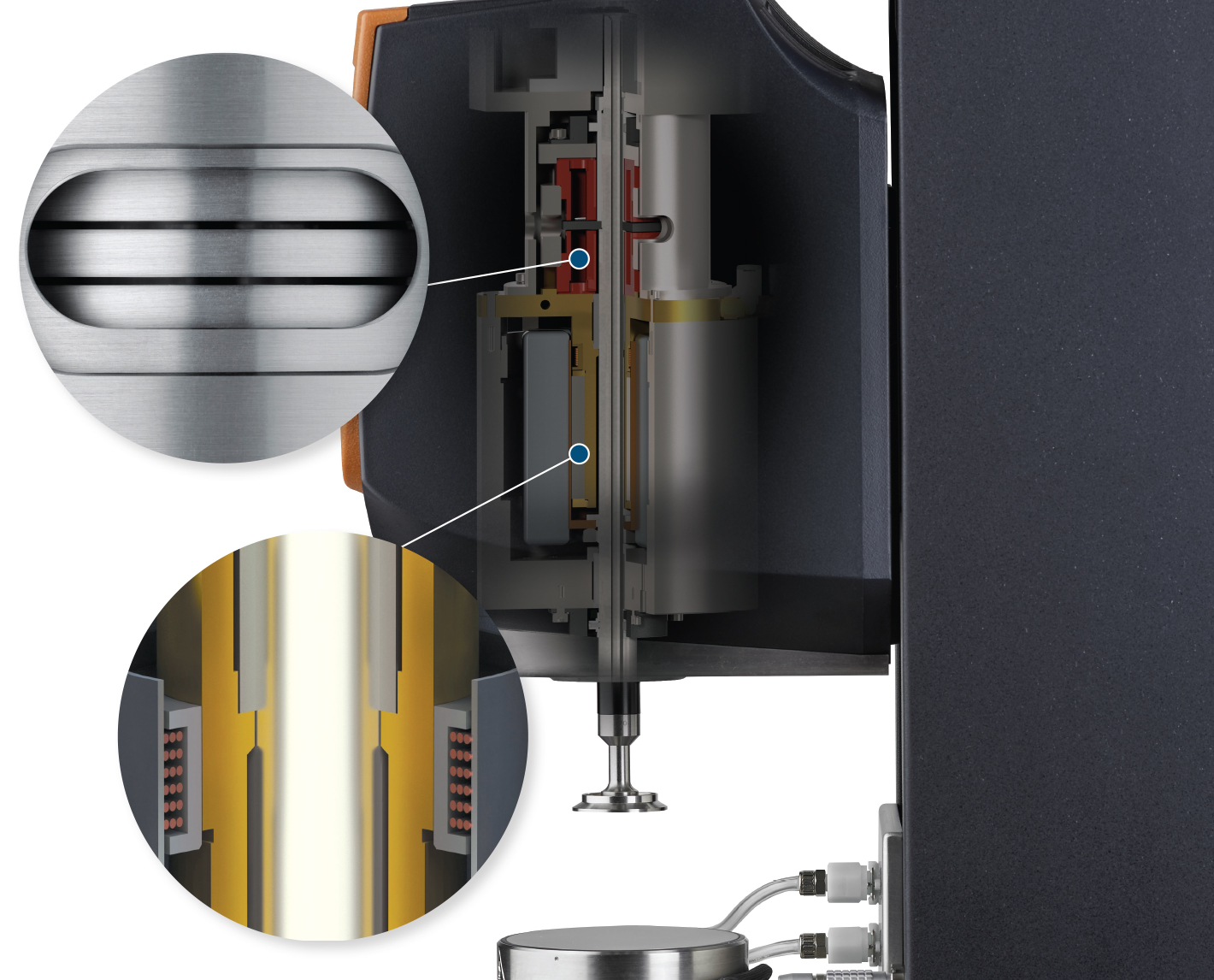
Report G’ and G” with confidence
The storage and loss modulus, G’ and G”, are two of the most insightful measurements provided by any rheometer.
The Discovery Hybrid Rheometer’s exclusive Optical Encoder Dual Reader improves phase angle precision by 70% compared to conventional single- reader designs. This leads directly to a more accurate measurement of G’, G”, and tan δ. This advantage becomes most evident under challenging experimental conditions such as low stresses, small strains, or difficult samples that exhibit only trace amounts of damping or elasticity. The Optical Encoder Dual Reader also provides a 5× improvement in displacement resolution, permitting more accurate measurements at lower strains.
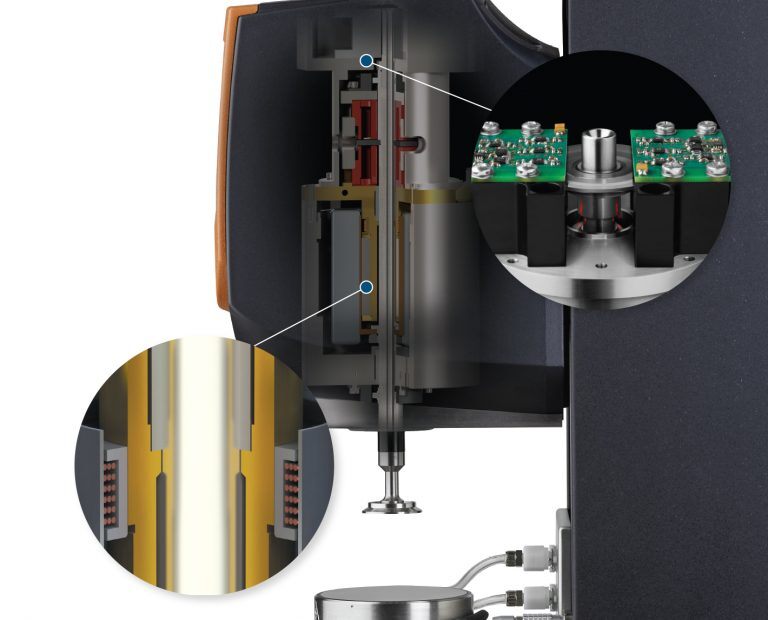
The Advanced Drag Cup Motor is optimized for accuracy in dynamic measurements. The low-mass and -radius design reduces system inertia by up to 80% compared to DC motors, minimizing corrections to oscillation data, especially at higher measurement frequencies. The result is a wider range of accurate measurement frequencies, material types, and experimental designs.
The measurement you want: Advanced Strain and Stress Control
The Discovery Hybrid Rheometer performs the experiment you want, whether stress-controlled, strain-controlled, or both. State-of-the-art high-speed electronics and the responsive Advanced Drag Cup Motor provide the fastest transient responses and accurate control in any type of deformation. Direct Strain oscillation provides real-time strain control at every point of the oscillatory measurement.
Responsive strain control ensures rapid data collection so you can characterize materials that are undergoing thermal, chemical, or structural transitions. Highly accurate deformation control (stress or strain) also ensures the highest data quality, particularly when evaluating materials that show a non-linear response at very large amplitudes.
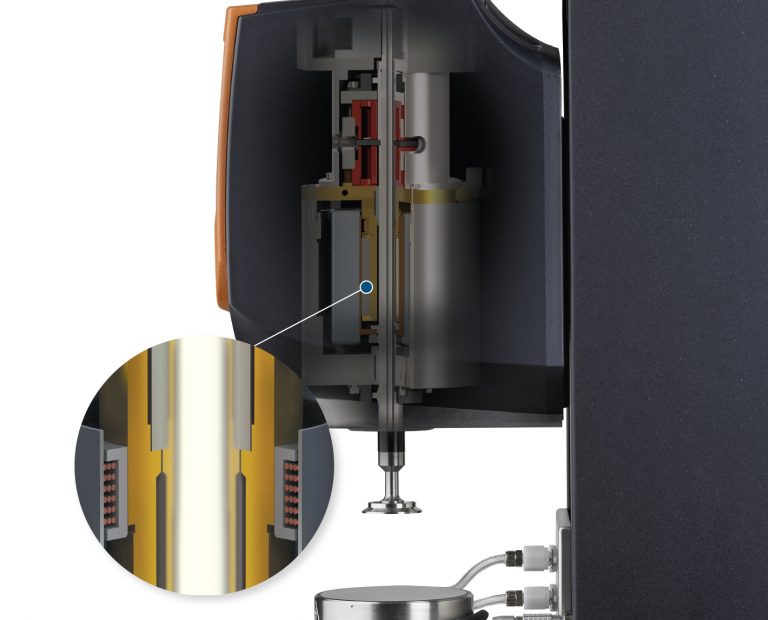
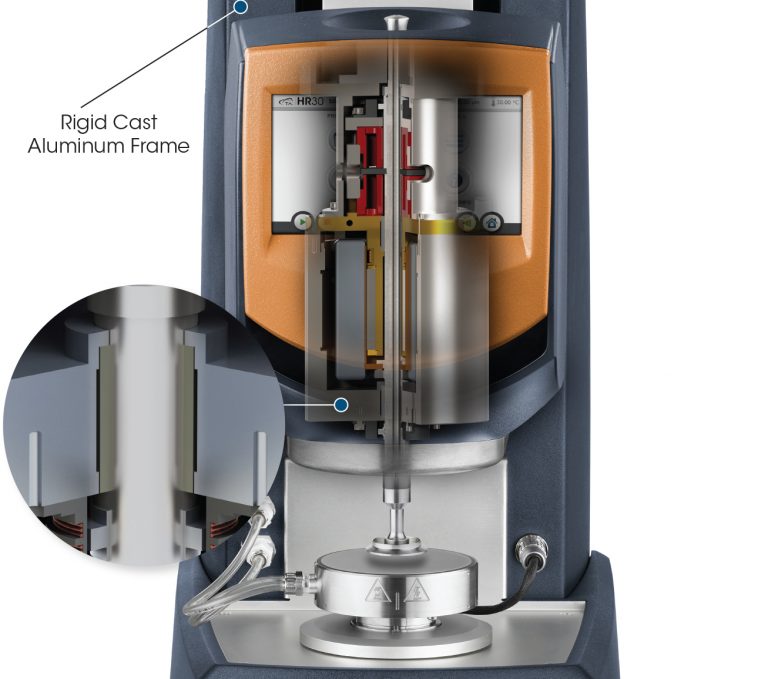
A rigid cast aluminum frame and rugged linear ball slide provide more than 60% greater axial and torsional stiffness than other designs and permit gap position resolution of 0.02 µm.
Two high-stiffness radial bearings stabilize the system from side loads exerted by samples or operators while the Optical Encoder Dual Reader further cancels displacement measurement drift associated with testing very stiff samples over long times.
The Advanced Drag Cup Motor provides stable control and measurement even when operating under extreme conditions. Active and passive thermal systems manage heat and account for system temperature, guaranteeing measurement accuracy under all test conditions.
These innovations provide the most accurate and sensitive measurement, under even the most extreme experimental conditions.
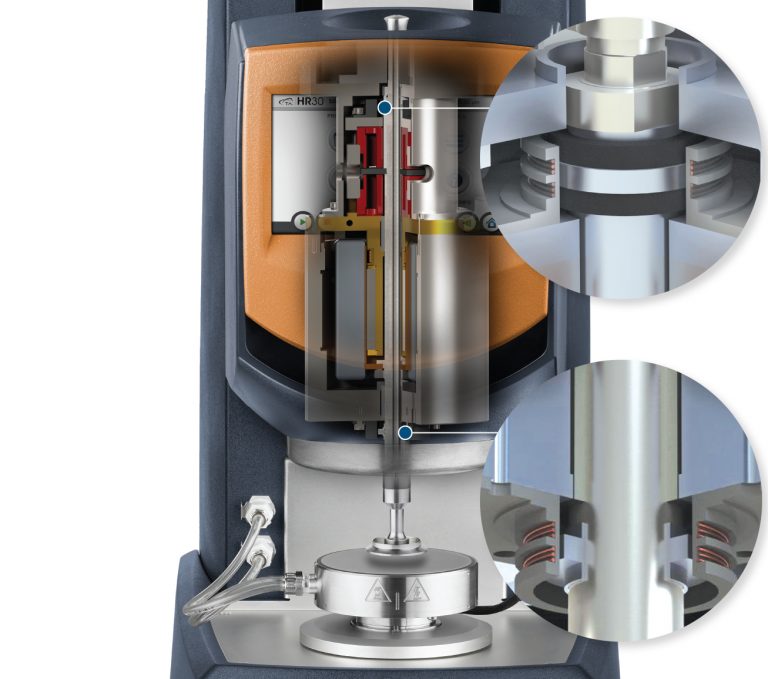
The DHR includes the patented True Position Sensor (TPS) for true gap accuracy. The TPS is a high-resolution linear position sensor that measures and compensates for the effects of thermal expansion in real time. Unlike competitive devices, the TPS eliminates errors associated with thermal expansion without the need for special high inertia iron core geometries and environmental systems.
The TPS works with all Smart Swap™ geometries and Smart Swap™ environmental systems.The Force Rebalance Transducer is the premier technology for normal force measurements. This active, non-compliant device accurately measures normal and axial forces without deflection. Competitive capacitive or strain gauge sensors rely on physical movement of the device to sense a force, resulting in measurement error. The FRT provides the most accurate normal force measurement by driving the linear motor to maintain zero deflection at all times and conditions. The FRT also works in conjunction with the magnetic thrust bearing to enable axial DMA capability.
The NEW Discovery Hybrid Rheometer is your invisible partner in the lab, reducing the time from question to insight.
Load samples with confidence and easeThe Discovery Hybrid Rheometer is designed by rheometer users to make sample loading faster, easier, and improve measurement precision for every operator.
Expedite routine interactions with a gap positioning system that is 3× faster than other rheometers while maintaining a 0.02 µm gap resolution. A convenient tactile keypad places the most common actions where you need them most, including thoughtful features like automated trim gap, measurement position, and bearing lock.
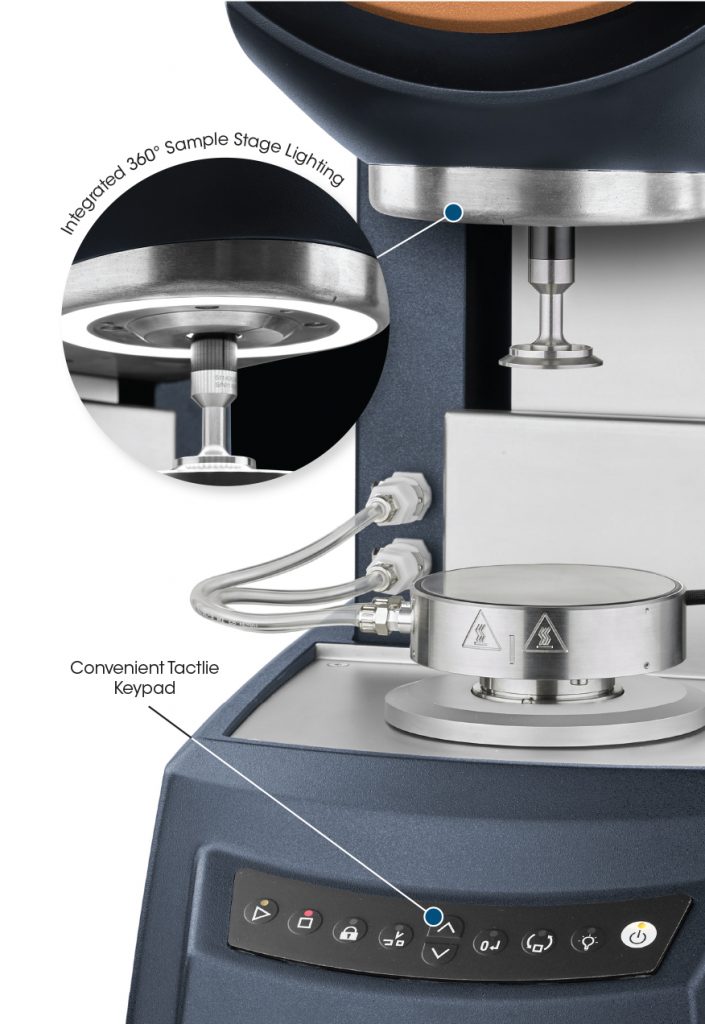
Even more power is offered by the brand new One-Touch-Away™ app-style touchscreen that greatly enhances usability by placing key instrument features at your fingertips.
Every user will appreciate the brand new integrated 360° sample stage lighting that enhances visibility in any lab environment. The result is easier, more repeatable sample loading and trimming, leading to improved data accuracy and precision.
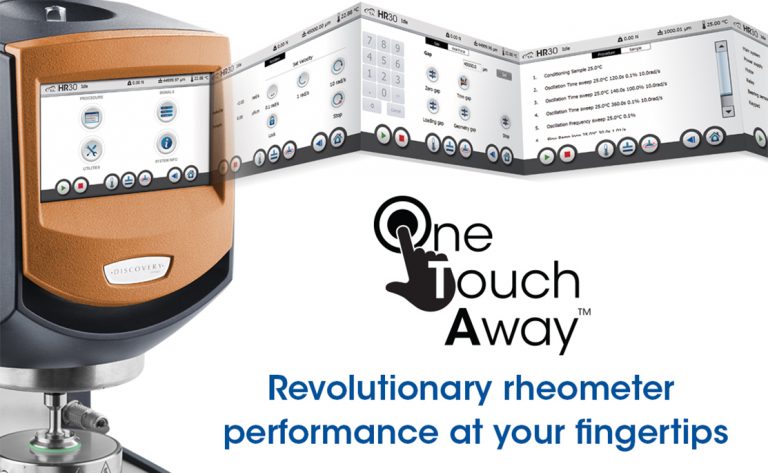
The new Discovery Hybrid Rheometer boasts a brand-new One-Touch-Away™ app-style touchscreen that greatly enhances usability by placing key instrument features at your fingertips.
The app-style touchscreen, powerful new TRIOS software, and quick robust calibration routines work seamlessly to dramatically improve laboratory workflows and productivity.
Versatility is being ready to face whatever the day brings. Whatever that may be, the NEW Discovery Hybrid Rheometer will be ready. The Discovery Hybrid Rheometer features the widest range of powerful, easy-to-use environmental systems and accessories that allow you to replicate demanding environmental conditions, incorporate complementary simultaneous measurements,or extend your rheometer beyond conventional shear rheology.
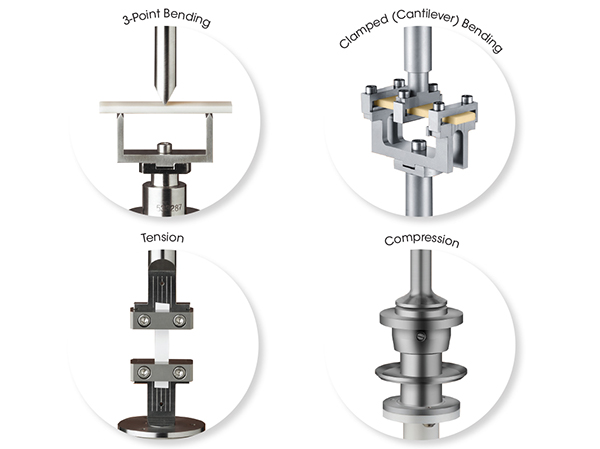
Backed by over four decades of TA Instruments’ expertise in rotational rheology and linear DMA measurements, the Discovery Hybrid Rheometer’s DMA Mode adds a new dimension for testing solid and soft-solid materials. Now, in addition to the most sensitive and accurate rotational shear measurements, the DHR can deliver accurate linear Dynamic Mechanical Analysis (DMA) data. Controlled axial oscillations permit the direct measurement of E’, E”, and tan 𝛿 in tension, bending and compression, a perfect addition to shear measurements, including solids in torsion. The new DMA mode is ideal for identifying a material’s transition temperatures and provides reliable measurements over the instrument’s full range of temperatures.
The axial DMA capability is enabled by the DHR’s active Force Rebalance Transducer (FRT) and patented magnetic bearing technologies that permit amplitude- controlled oscillatory deformation in the axial direction. Installation of external components is never required, so it is always quick and easy to get great data! Competitive instruments that employ air bearings and passive normal force measurements are inherently incapable of such measurements without costly modifications.
DMA Mode| Specifications | |
| Motor Control | Force Rebalance Transducer |
| Minimum Force in Oscillation | 3 mN |
| Maximum Axial Force | 50 N |
| Minimum Displacement in Oscillation | 0.01 μm |
| Maximum Displacement in Oscillation | 100 μm |
| Axial Frequency Range |
6×10-5 rad/s to 100 rad/s (10-5 Hz to 16 Hz) |
The NEW Smart Swap™ 2 geometry system features an all new system for optical information storage and transfer.This system provides greater storage and durability than chip-based systems. When attached, the complete geometry information, including unique dimensions is automatically detected and the software is appropriately configured.
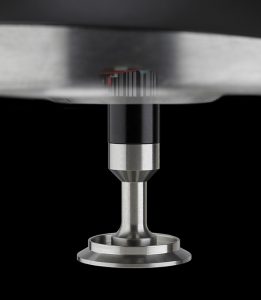
Only TA Instruments offers the convenience and versatility of Smart Swap™ temperature control options and accessories. Smart Swap™ options are attached to the instrument on its unique magnetic base, providing faster, easier installation than mechanical systems. Once attached, the instrument automatically detects and configures the system for operation.
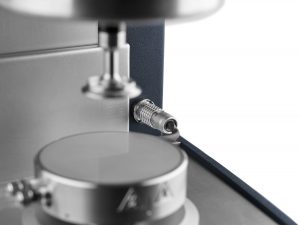
TRIOS for the Discovery Hybrid Rheometer features two powerful user interfaces that present users with what they need to collect the data they want.

TRIOS Express helps users to design the most common measurements quickly and easily. Simple forms and sensible defaults streamline the process of experiment design and execution.

TRIOS Unlimited gives you complete control. A robust set of detailed experimental controls and data collection options ensures that you will be able to design the experiment you envision and collect the data you need.
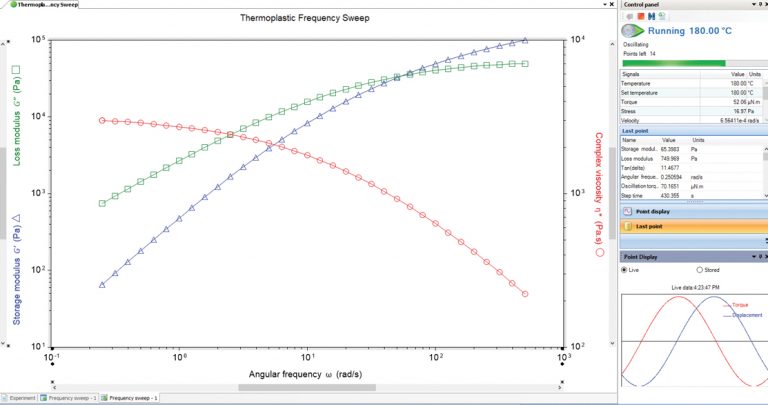
The advanced data collection system automatically saves all relevant signals, active calibrations, and system settings. Waveforms for each data point may be displayed as Lissajous plots and provide a visual representation of the stress-strain relationship. This comprehensive set of information is invaluable for method development, procedure deployment and data validation.
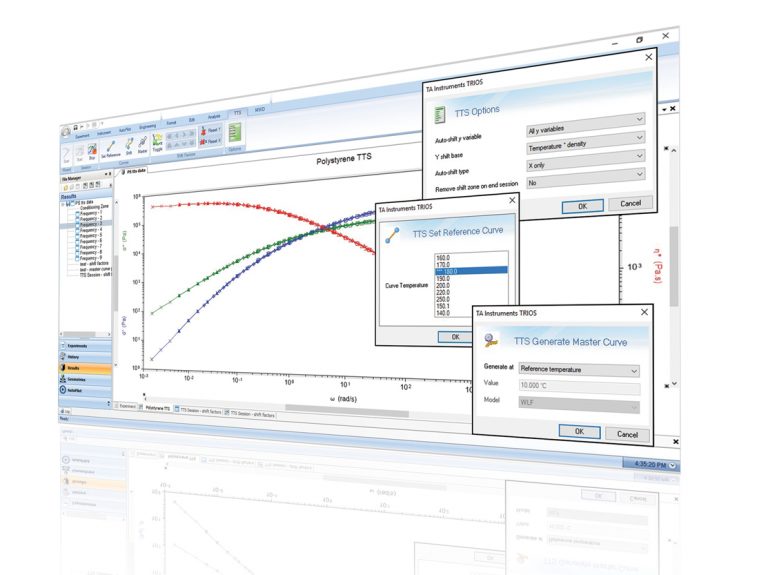
A comprehensive set of relevant tools are available for real-time data analysis, even during experiments. Gain actionable insights into your material behavior through a powerful and versatile set of features seamlessly integrated into TRIOS.
All Standard Analyses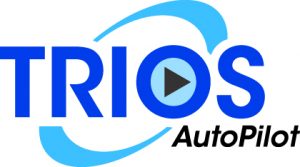
Experience a new paradigm in software functionality and unleash the full potential of your Discovery Hybrid Rheometer with AutoPilot, a premium feature that enables complete automation of powerful TRIOS software.
AutoPilot allows users to quickly and easily create automated routines: from test methods to data analysis and report generation. These routines empower laboratories to streamline and standardize operations and decision-making across local or global laboratory enterprises. From quality control to research and development, laboratory environments of all types will benefit from increased productivity, improved data precision, and reduced training time.
See AutoPilot Discovery HRTA Instruments invites you to experience a new paradigm in software functionality. Unleash the full potential of your Discovery Hybrid Rheometer with AutoPilot, a premium feature that enables automation of TRIOS software. AutoPilot allows users to quickly and easily create automated routines: from test methods to data analysis and report generation. These routines empower laboratories to streamline and standardize operations and decision-making across local or global laboratory enterprises. From quality control to research and development, laboratory environments of all types will benefit from increased productivity, improved data precision, and reduced training time.
AutoPilot includes a customizable TRIOS ribbon and OneTouch, a simplified single-click user interface. Save time by centrally locating SOPs in the configurable OneTouch layout. Quickly execute common tasks using custom ribbon buttons. With a single click, operators will be able to reliably and repeatably execute complex procedures.
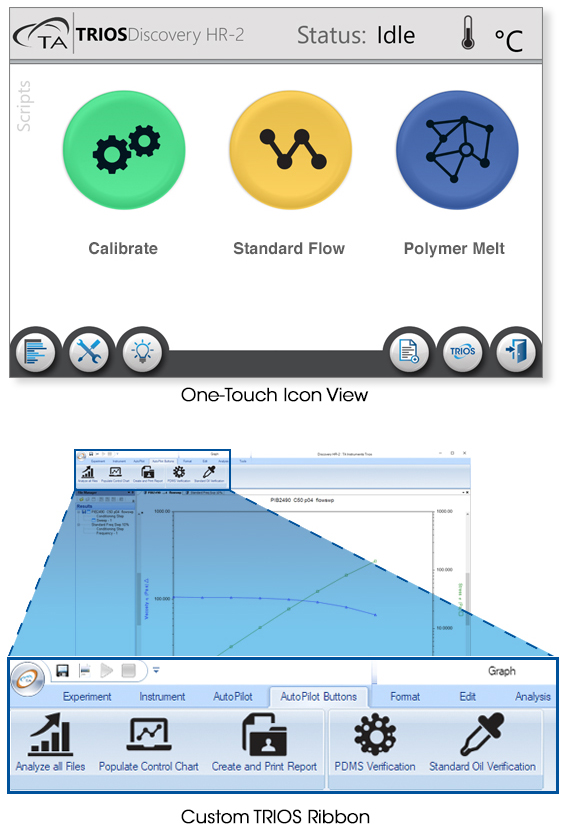
AutoPilot allows for guided operation of the Discovery Hybrid Rheometer. Utilize the available audio and video playback capability and interactive prompts to instruct users on proper operational techniques for obtaining quality rheological data.
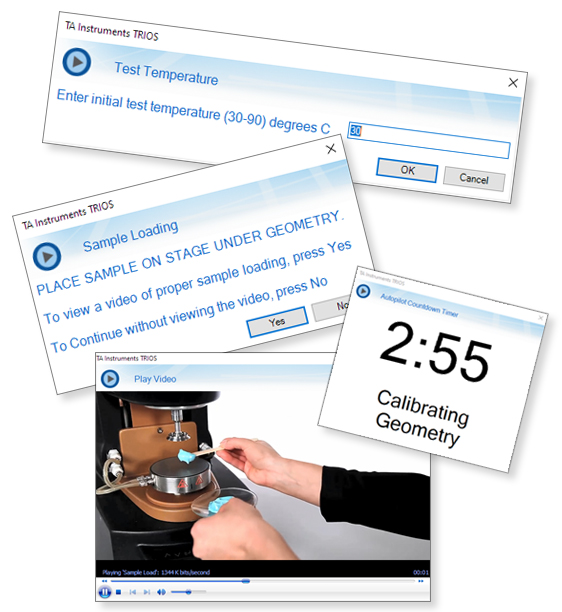
AutoPilot provides the ability to automate all the powerful TRIOS functions like data analysis and report generation, plus instrument actions like calibrations and temperature and gap commands. With more than 100 programmable operations, users can:
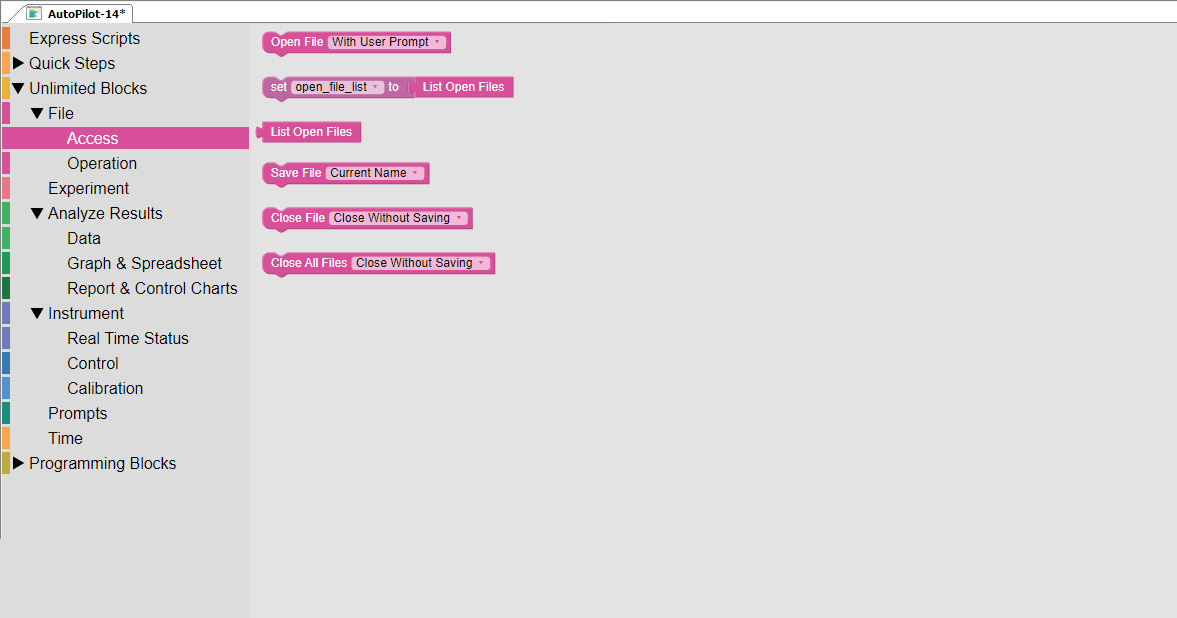
AutoPilot scripts are built using Google’s visual programming interface, Blockly. The drag and drop constructs enable effortless script creation. Perform complex tasks out of the box using the included example scripts or create your own using Quick Steps and Express Scripts; preconfigured routines that enable the rapid development of intricate procedures.

AutoPilot provides a seamless mechanism for integration into any LIMS system. Programmatically export the raw data for incorporation by any third-party. Out of the box supported formats include text, xml, and xls.
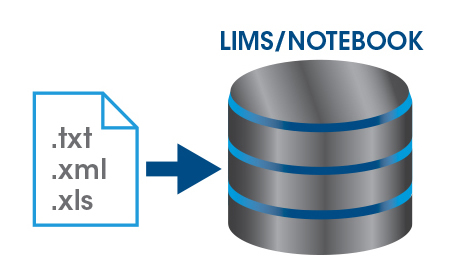
Contact us to request a quote or learn more about our new products.
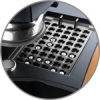
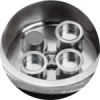
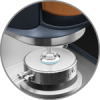
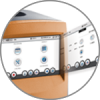
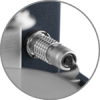
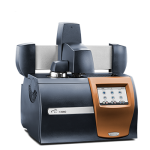
September 9, 2020 (Wed) 11:00 US/Eastern
Jason Saienga, Ph.D.
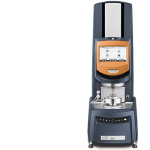
September 10, 2020 (Thu) 11:00 US/Eastern
Alina Latshaw, Ph.D.

September 15, 2020 (Tue) 11:00 US/Eastern
Jason Saienga, Ph.D.
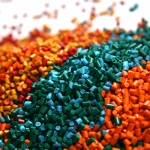
September 16, 2020 (Wed) 11:00 US/Eastern
Bharath Rajaram, Ph.D.
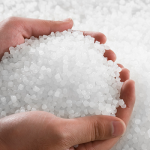
September 17, 2020 (Thu) 11:00 US/Eastern
Gray Slough, Ph.D.
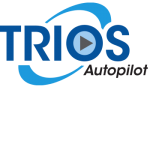
Bharath Rajaram, Ph.D.
Discover how the new TRIOS AutoPilot software system enables you to standardize rheology workflow processes and decision-making.
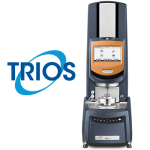
September 30, 2020 (Wed) 11:00 US/Eastern
Registration is closed for this event.
Sarah Cotts